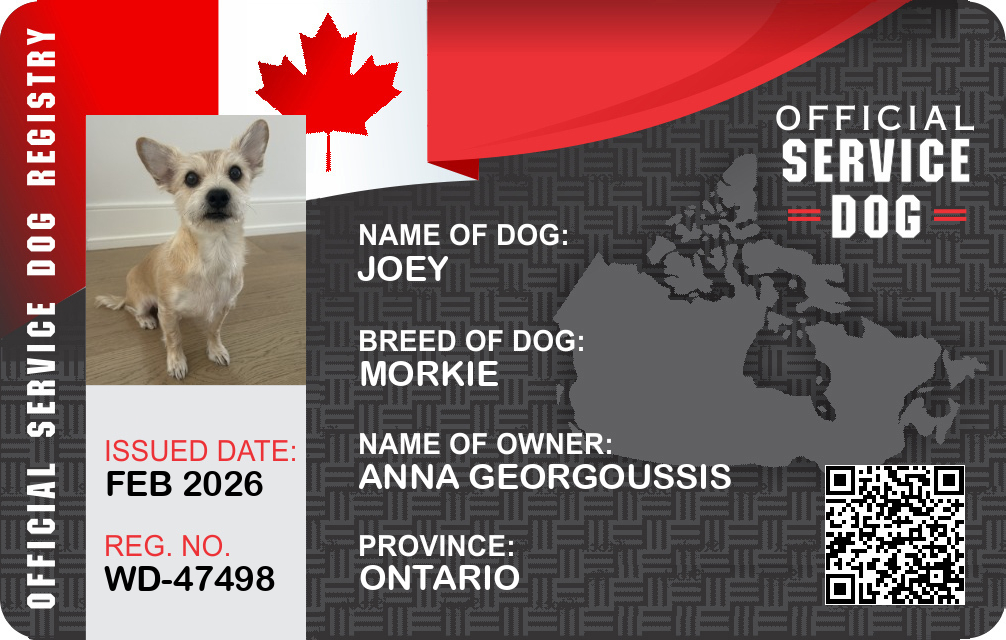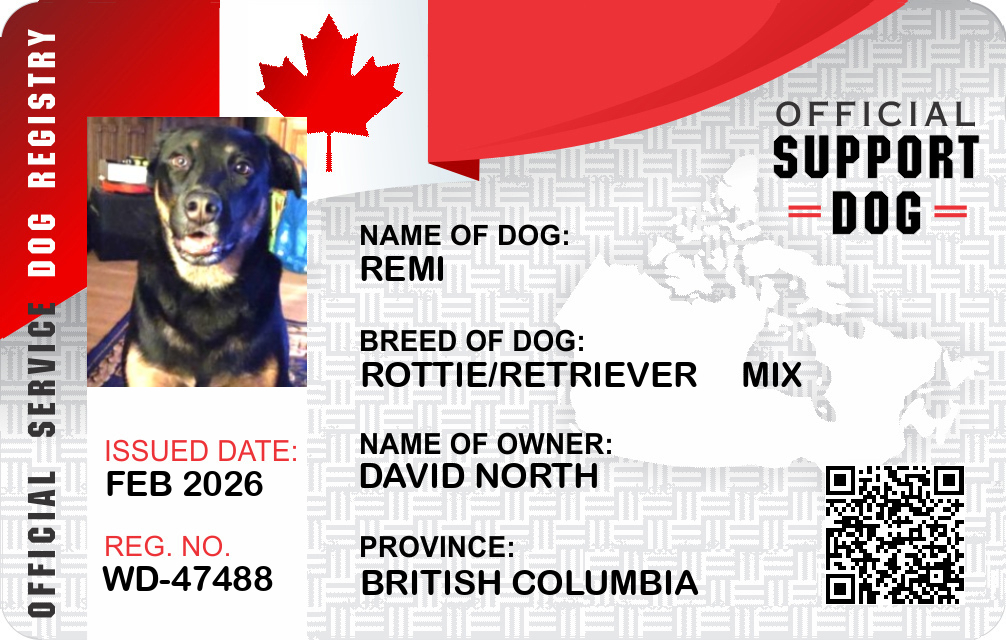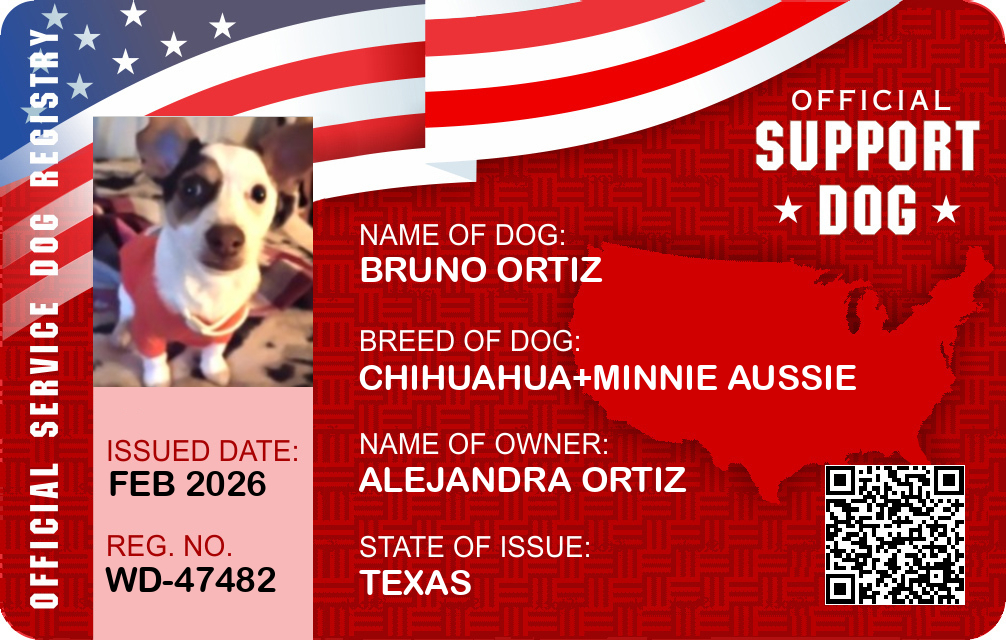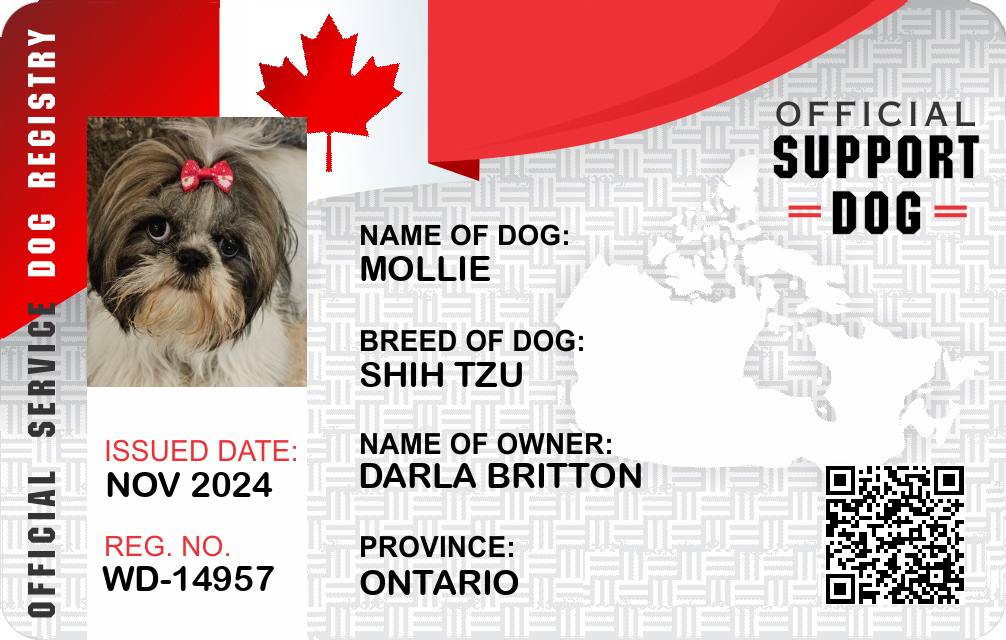California Service Dog Laws
Get Your Documents
Example State Cards


Service dogs play an invaluable role in the lives of individuals with disabilities, helping to improve their quality of life and facilitate greater independence. California, with its extensive legislative framework and commitment to disability rights, provides comprehensive guidelines regarding the use of service dogs. This article delves into these laws, offering a detailed understanding of federal and state-specific regulations, rights, limitations, and practical guidance for service dog handlers in California.
Overview of Service Dog and Legal Definitions in California
What is a Service Dog?
A service dog is specifically trained to perform tasks for an individual with a disability, including physical, sensory, psychiatric, intellectual, or other mental disabilities. The Americans with Disabilities Act (ADA) specifies that the tasks performed by the service animal must be directly related to the person’s disability. Such tasks can range from guiding individuals with visual impairments to alerting individuals with hearing impairments or retrieving items for those with mobility issues.
How Service Dogs Differ from Other Types of Assistance Animals
Service dogs differ from other assistance animals, such as emotional support animals (ESA), therapy animals, and companion animals, in both function and legal status. Service dogs are trained to perform specific tasks that mitigate their handler’s disabilities. In contrast, ESA provide comfort through their presence and are not required to perform specific tasks. While ESA are recognized under certain housing laws, they do not have the same public access rights under the ADA as service dogs.
Key Federal Laws Affecting Service Dogs
#### Americans with Disabilities Act (ADA)
The ADA is a pivotal piece of federal legislation that sets the standard for service dog access across the United States. Under the ADA, service dogs are allowed to accompany their handlers into public places such as restaurants, hotels, and stores, where pets are typically not permitted. It prohibits discrimination based on disability, ensuring individuals who use service dogs have equal access to public services and amenities.
#### Fair Housing Act (FHA)
The FHA recognizes the role of service dogs and ESA in housing situations. It mandates that landlords make reasonable accommodations for individuals with a disability, including allowing service animals in housing units where pets are usually restricted. This law applies to most housing types, with some exceptions.
#### Air Carrier Access Act (ACAA)
The ACAA governs the transportation of service dogs on flights. This law ensures that airlines accommodate passengers with disabilities and allow them to travel with their service dogs in the cabin at no additional charge, provided the dog’s behavior meets airline requirements.
State-Specific Service Dog Laws in California
Housing Rights and Responsibilities
California’s Fair Employment and Housing Act (FEHA) provides protections that extend beyond federal mandates. It requires housing providers to accommodate individuals with disabilities and their service dogs, barring any undue hardship. Tenants cannot be charged additional fees for having a service dog, although they remain responsible for any damages caused by the animal.
Public Access and Accommodation
California law reaffirms the ADA’s provisions, ensuring that service dogs have the right to accompany their handlers in all areas open to the public. This includes access to government buildings, medical facilities, hotels, restaurants, and entertainment venues. Businesses and establishments must not discriminate against service dog handlers and are limited in the questions they can ask. They may only inquire if the dog is a service animal and what tasks it is trained to perform.
Transportation and Travel Rules
Under California law, service dogs are allowed on public transport systems, such as buses and trains, to facilitate ease of movement for individuals with disabilities. Public transportation entities must accommodate service dogs without extra charges. Additionally, California airports align with the ACAA to ensure seamless travel for service dog handlers, with designated relief areas for service animals within the airport.
Employment and Workplace Considerations
The California Department of Fair Employment and Housing outlines that employers must provide reasonable accommodations in the workplace for employees who require a service dog. This might include adjustments to office arrangements or break schedules. Employers are not typically allowed to inquire extensively about the employee’s disability or require excessive documentation regarding the service dog.
Documentation, Requirements, and Processes in California
Service Dog Documentation and Who Can Issue It
In California, service dog handlers are typically not required to provide documentation to prove their dog’s status in public access situations. However, certain scenarios, such as housing and employment, may require individuals to provide letters from healthcare providers that attest to the need for a service dog.
Landlord, Business, and Provider Verification Rules
Landlords and business owners can only request minimal verification about service dogs, focusing on whether the dog is required because of a disability and what specific tasks the dog has been trained to perform. They cannot ask for extensive proof or demand medical documentation.
Rights, Limitations, and Legal Risks
Rights Service Dog Handlers Have in California
- Public Access: Service dogs are allowed in any public space accessible to their handlers.
- Housing: No extra fees or deposits can be charged for service dogs in any housing accommodations.
- Transportation: Handlers have the right to travel with their service dogs on public transport and flights without additional charges.
- Employment: Reasonable accommodations must be made by employers without invasive questioning about the handler’s disability.
Limits on Service Dog Protections and Common Restrictions
- Behavior Expectations: Service dogs must be well-behaved and under control at all times. Misconduct or disruption can lead to removal.
- Prohibition in Specific Areas: Certain areas, such as hospital sterile zones, may legally restrict access to service dogs.
- Fraudulent Representation: Misrepresenting a dog as a service animal is illegal and undermines trust in genuine service dog teams.
Penalties for Fraud or Misrepresentation
California enforces strict penalties for those who falsely claim their dog as a service animal. Under the California Penal Code, misrepresentation can lead to fines and, in some cases, misdemeanor charges. This ensures that only legitimate service dog teams benefit from legal protections.
Practical Guidance for Service Dog Handlers in California
How to Qualify for a Service Dog Legitimately
Individuals seeking a service dog should carefully assess their needs and obtain certification through reputable and accredited service dog training programs. Documentation from healthcare professionals should clearly state the necessity of a service dog in managing a disability.
How to Talk to Landlords, Airlines, and Employers
- Landlords: Present documentation succinctly and clarify any questions regarding the role of the service dog in mitigating the disability.
- Airlines: Notify in advance and comply with all procedural requirements to facilitate a smooth boarding process.
- Employers: Discuss necessary accommodations and may present a doctor’s note if required.
Summary of Service Dog Laws in California
In summary, California offers robust protections for service dog handlers. However, adherence to legal norms and respectful collaboration with landlords, employers, and public service providers are essential. Service dog handlers should remain knowledgeable about both federal and state laws to enforce their rights and prevent misunderstandings.
Key Points:
- Service Definition: Task-trained for disability.
- Legal Protections: Public access, housing, travel, employment.
- Documentation: Minimal but specific.
- Behavior Standards: Control and cleanliness.
- Fraud Penalties: Fines/misdemeanor charges.
- Practical Tips: Educate all stakeholders respectfully.
Service dog handlers in California are strongly advised to keep abreast of changing laws and standards, seek support when needed, and maintain clear communication with entities that impact their daily lives. This proactive approach helps to safeguard their rights, maintain public goodwill, and protect the integrity of service dog usage.
Get Your Documents
Example State Cards













